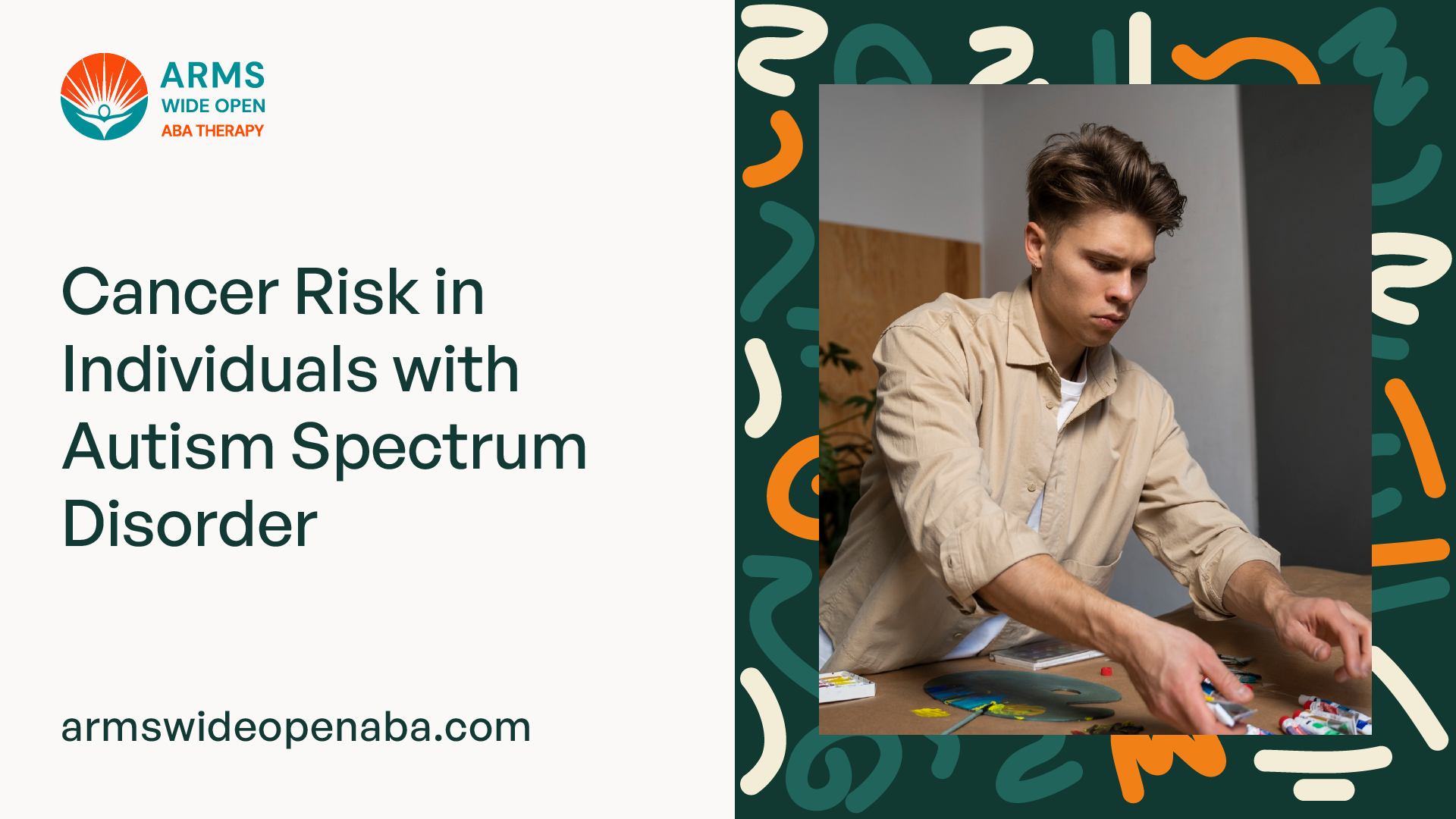Cancer Risk in Individuals with Autism Spectrum Disorder
Unveiling the link between autism and cancer risk. Explore the research findings and implications for prevention strategies.

Understanding Autism Spectrum Disorder (ASD)
To comprehend the link between Autism Spectrum Disorder (ASD) and cancer risk, it is essential to first understand what ASD is and the prevalence and characteristics associated with it.

What is Autism Spectrum Disorder?
Autism Spectrum Disorder (ASD) is a neurodevelopmental disorder that affects communication, social interaction, and behavior. It is characterized by a wide range of symptoms, abilities, and challenges that can vary from person to person.
Individuals with ASD might have difficulty with social interaction, exhibit repetitive behaviors, face challenges in verbal and nonverbal communication, and display narrow interests or fixations. The severity of these symptoms can range from mild to severe, impacting an individual's daily functioning and quality of life.
Prevalence and Characteristics of ASD
ASD is a fairly common developmental disorder, with a growing prevalence worldwide. According to the Centers for Disease Control and Prevention (CDC), approximately 1 in 54 children in the United States is diagnosed with ASD. Boys are more likely to be diagnosed with ASD than girls, with a male-to-female ratio of around 4:1.
While the exact cause of ASD remains unclear, research suggests that a combination of genetic and environmental factors contribute to its development. There is also evidence to suggest that certain medical conditions, such as epilepsy and intellectual disabilities, are more prevalent among individuals with ASD.
Understanding the prevalence and characteristics of ASD is crucial in identifying potential links between ASD and other health conditions, such as cancer. By exploring the research findings and potential explanations for the link, we can gain valuable insights into the complex relationship between ASD and cancer risk.
Link Between Autism Spectrum Disorder and Cancer Risk
Autism Spectrum Disorder (ASD) is a neurodevelopmental disorder characterized by difficulties in social interaction, communication, and repetitive behaviors. Recent research has explored the potential link between ASD and an increased risk of certain types of cancer. In this section, we will delve into the research findings and the common types of cancer associated with ASD.
Exploring the Research Findings
While the relationship between ASD and cancer risk is still being investigated, several studies have suggested a possible association. Researchers have observed higher rates of cancer in individuals with ASD compared to the general population. However, it is important to note that the overall risk remains relatively low.
Studies have also indicated that individuals with ASD may have a higher risk of developing specific types of cancer, such as:
- Brain tumors: Research has shown an increased prevalence of brain tumors, including gliomas and medulloblastomas, in individuals with ASD.
- Leukemia: Some studies have reported a higher incidence of leukemia, particularly acute lymphoblastic leukemia (ALL), in individuals with ASD.
- Gastrointestinal (GI) cancers: Certain GI cancers, such as colorectal and pancreatic cancer, have also been found to have a higher occurrence in individuals with ASD.
It is crucial to understand that the link between ASD and cancer risk is still being explored, and further research is needed to establish a clear cause-and-effect relationship.
Common Types of Cancer Associated with ASD
Type of CancerIncreased Risk in ASDBrain tumors (e.g., gliomas, medulloblastomas)YesLeukemia (e.g., acute lymphoblastic leukemia)YesGastrointestinal (GI) cancers (e.g., colorectal, pancreatic)Yes
The table above summarizes the common types of cancer that have shown an increased risk in individuals with ASD. However, it's important to note that not all individuals with ASD will develop cancer, and the overall risk remains relatively low.
Understanding the potential association between ASD and cancer risk is crucial for healthcare professionals and individuals with ASD and their families. It highlights the importance of regular health check-ups, early detection, and intervention strategies to monitor and manage any potential cancer-related concerns. Continued research in this field will contribute to a better understanding of the underlying mechanisms and potential implications for treatment and prevention strategies.
Possible Explanations for the Link
The link between Autism Spectrum Disorder (ASD) and an increased risk of cancer has been the subject of scientific research. While the exact mechanisms behind this association are not fully understood, several possible explanations have been proposed. These include genetic factors, shared biological mechanisms, and environmental factors.
Genetic Factors
Genetic factors are believed to play a role in both autism spectrum disorder and cancer development. Studies have identified certain genes that are associated with an increased risk of both conditions. It is suggested that these shared genetic factors may contribute to the observed link between ASD and cancer.
To better understand the genetic factors involved, researchers have conducted genome-wide association studies (GWAS) and identified specific gene variants that may be implicated. However, it is important to note that not all individuals with ASD will develop cancer, and the presence of these gene variants does not guarantee the development of cancer.
Shared Biological Mechanisms
Another possible explanation for the link between ASD and cancer is the presence of shared biological mechanisms. Both conditions involve dysregulation of cellular processes, such as cell growth, proliferation, and differentiation. Disruptions in these mechanisms can lead to abnormal cell growth and potentially increase the risk of cancer.
Recent studies have highlighted the involvement of certain molecular pathways that are disrupted in both autism and cancer. These pathways include those related to DNA repair, immune system function, and inflammation. Further research is needed to unravel the specific mechanisms linking ASD and cancer at a cellular level.
Environmental Factors
Environmental factors are also being investigated as potential contributors to the link between ASD and cancer. Exposure to certain environmental factors during critical periods of development may increase the risk of both conditions.
Some environmental factors that have been studied include maternal exposure to certain medications, chemicals, or infections during pregnancy, as well as exposure to environmental toxins during early childhood. However, it is important to note that not all individuals with ASD have been exposed to these factors, and the relationship between environmental exposures and ASD-cancer risk needs further exploration.
Understanding the possible explanations for the link between ASD and cancer is crucial for advancing research, improving early detection, and implementing appropriate interventions. By investigating genetic factors, shared biological mechanisms, and environmental influences, researchers can gain valuable insights into the complex relationship between these two conditions.
Managing Cancer Risk in Individuals with ASD
When it comes to individuals with Autism Spectrum Disorder (ASD), managing cancer risk is an important aspect of their overall health. While research suggests a potential link between ASD and certain types of cancer, it's crucial to focus on proactive measures to promote well-being. Here are three key strategies for managing cancer risk in individuals with ASD: importance of regular health check-ups, promoting healthy lifestyle choices, and early detection and intervention.
Importance of Regular Health Check-ups
Regular health check-ups play a pivotal role in monitoring the overall health of individuals with ASD and detecting any potential signs of cancer at an early stage. These check-ups should include comprehensive physical examinations, blood tests, and screenings based on age and gender-specific cancer risk factors.
It is recommended that individuals with ASD follow the general guidelines for cancer screenings as recommended by healthcare professionals. This may include screenings for breast, colorectal, cervical, and prostate cancer, depending on age and gender. The frequency and timing of these screenings may vary based on individual risk factors and professional recommendations.
Promoting Healthy Lifestyle Choices
Adopting a healthy lifestyle is beneficial for individuals with ASD in reducing their risk of cancer. Encouraging regular physical activity, a balanced diet, and adequate hydration are important components of a healthy lifestyle. Eating a variety of fruits, vegetables, whole grains, and lean proteins can provide essential nutrients that support overall health and reduce the risk of cancer.
In addition, avoiding tobacco and limiting alcohol consumption are essential steps in cancer prevention. Individuals with ASD should be educated about the potential health risks associated with smoking and excessive alcohol intake. Providing support and resources to help them make informed decisions can contribute to long-term health benefits.
Early Detection and Intervention
Early detection of cancer is crucial for successful treatment outcomes. Individuals with ASD may face challenges in recognizing and communicating symptoms, making it essential for caregivers, parents, and healthcare professionals to remain vigilant. Regular observation and communication with healthcare providers can help identify any potential signs of cancer.
Additionally, raising awareness among individuals with ASD about self-examination techniques and empowering them to communicate any changes or discomfort they may experience is important. Encouraging open and honest dialogue about their health can lead to early detection and timely intervention.
By emphasizing the importance of regular health check-ups, promoting healthy lifestyle choices, and encouraging early detection and intervention, individuals with ASD can effectively manage their cancer risk. It is essential to work closely with healthcare professionals to develop personalized plans that address their unique needs and ensure optimal health outcomes.
Future Directions for Research
As the link between Autism Spectrum Disorder (ASD) and cancer risk continues to be explored, researchers are focusing on advancing our understanding of this complex relationship. These future research directions aim to shed light on the underlying mechanisms and implications for treatment and prevention strategies.
Advancements in Understanding the Link
Ongoing research efforts are aimed at uncovering the intricacies of the link between ASD and cancer risk. Scientists are conducting studies to further investigate the genetic factors, shared biological mechanisms, and environmental influences that may contribute to the increased cancer risk in individuals with ASD. Through advancements in technology and the use of large-scale cohort studies, researchers are gaining a deeper understanding of the specific risk factors and potential interactions involved.
Implications for Treatment and Prevention Strategies
Understanding the link between ASD and cancer risk has significant implications for developing effective treatment and prevention strategies. As researchers uncover the underlying mechanisms, it may be possible to identify novel targets for therapeutic interventions. Additionally, this knowledge can inform preventive measures that can be taken to reduce the risk of developing cancer in individuals with ASD. These interventions may include early detection through regular health check-ups, promoting healthy lifestyle choices, and implementing targeted screening protocols.
Collaborative Efforts in the Field
Given the complexity of the link between ASD and cancer risk, collaboration among researchers, healthcare professionals, and advocacy organizations is crucial. Collaborative efforts facilitate the sharing of knowledge, resources, and data, enabling a more comprehensive understanding of this relationship. By working together, researchers can accelerate progress and make significant strides in unraveling the complexities of ASD and its association with cancer risk. This collaboration also ensures that the findings are translated into practical applications that can benefit individuals with ASD and reduce their cancer risk.
Continued research in these future directions holds great promise for providing valuable insights into the link between ASD and cancer risk. By advancing our understanding, identifying effective treatment and prevention strategies, and fostering collaboration in the field, we can make significant progress in improving the health outcomes of individuals with ASD and reducing their cancer risk.
Sources
https://www.medscape.com/viewarticle/976345
https://pubmed.ncbi.nlm.nih.gov/35430370/
https://www.sciencedirect.com/science/article/pii/S0923753422006901
Similar articles
We’re here to help you

Our team is here to assist you in this process. Contact us for any assistance.
it’s easy to apply
We Accept Most Insurances
Our in-network insurance partnerships make ABA therapy more accessible to families throughout our service areas.







Our Insurance Process
We'll request your insurance details to help us verify your plan's coverage for ABA therapy. Once we've received this information, we'll walk you through your benefits, including copayments, deductibles and out-of-pocket maximums, so you know what to expect in advance.
Our team will then handle the preauthorization and all the necessary paperwork.
.svg)





















.jpeg)


































.jpeg)




.jpeg)







.jpeg)











.jpeg)
















